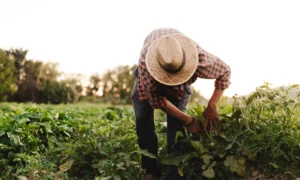Vence, a US startup that offers ‘virtual fencing’ for ranchers using regenerative ag practices, has secured funding from the venture arms of two major corporates: Merck & Co and oil and gas giant Shell.
Adding “a few million” dollars to Vence’s earlier $12 million Series A round, the deal will also see the San Diego-based startup partner with both investors to scale and improve its offering, according to CEO Frank Wooten.
Born in 2016, Vence fits wearable collars to cattle to help ranchers rotationally graze their herds without investing in physical fences – a major cost component for livestock farmers looking to transition to regenerative agriculture.
Rotational grazing – or holistic planned grazing – attempts to mimic the natural movement of herds across land whereby they frequently occupy and vacate new pasture, fertilizing and promoting grass growth on the ground they’ve just left and not over-grazing it. Research and real-life examples have shown these methods are able to regenerate grasslands, encourage the development of high-quality pasture, and sequester carbon from the atmosphere.
The last of these is of particular interest to Shell, for obvious reasons: the company has enormous Scope 1 and 3 emissions to offset under a target of being net-zero by 2050 or sooner.
In 2020, Shell launched its ‘nature-based solutions‘ business to “invest in forests, grasslands, wetlands, and other natural ecosystems around the world to reduce emissions and capture more [carbon] while benefiting biodiversity and local communities.” As part of that initiative, Shell acquired Select Carbon, an Australian company that helps farmers and other landowners to generate and sell carbon credits from practices like rotational grazing.
According to Wooten, that acquisition revealed the potential for rotational grazing to enable large-scale carbon sequestration; and that, in turn, led Shell to Vence.
“Our technology eases the adoption of rotational grazing for ranchers,” he told AFN. “The main challenge of adopting rotational grazing techniques is the additional expense for fencing and additional labor, which is about 30% of total costs for a livestock farm.”
While increasing productivity for livestock farmers was and still is the main focus for Vence – which views rotational grazing as a means to generate better returns from improved grass growth, soil health, and stocking numbers – its technology is now producing a data byproduct, or “data fume” as Wooten described it. This can be used for generating carbon credits as well as traceability applications.
And that’s where Merck Animal Health comes in. Following its 2019 acquisition of Antelliq, it’s the owner of Allflex, the biggest animal tracking business in the world with over 10 million RFDI devices worldwide – predominantly on dairy cattle. Wooten said that Merck and Vence will look at how they can integrate their technologies to track the source and sustainability of any animal as it moves through the supply chain.
Later iterations of Vence’s technology are likely to add animal health and welfare monitoring capabilities, he added.
Vence is used on 25 farms across the US and Australia, and aims to quadruple its footprint with 40,000 devices deployed by the end of this year.
Shell invested via Shell Ventures and Merck through its Merck Animal Health Ventures unit.





